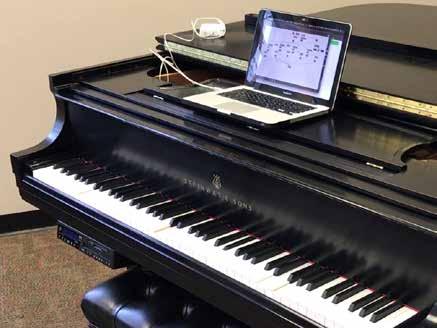
4 minute read
Heath Hicks: MA project gets the green light
By Kate Luce
Heath Hicks, Master of Communication ’19, is utilizing the skills he learned in the program and implementing them in his job at Dometic as an IT specialist. Dometic is headquartered in Stockholm, Sweden and Elkhart, Indiana. The company is involved in the production of products for every aspect of mobile living.
Advertisement
During his time at IU South Bend, Communication Studies always caught his interest. Hicks also graduated with a Bachelor’s in Mass Communication ’06. His concentrations were in audio and video production and public relations.
In 2014, Hicks came back to IU South Bend, intending to work on his MBA, but he found out from a former professor that Communication Studies would soon be offering a graduate program. So, he left the world of economics and accounting for communication studies and returned to his roots at IU South Bend.
“Initially I wanted to focus more on the Political Communication aspect so I focused a lot of my early research proposals and study on how politicians used social media as a catalyst for direct one way communication with their audience as a means of political influence. I really wanted to focus on the power of Donald Trump’s tweets and the effects it has mainly among the alt right and their opinion about political issues and the 'mainstream media.' Unfortunately, that was too large of a project, so my faculty advisor and I decided that my second strong suit was in the Organizational Communication area. So, my capstone project is based in that area of Communication Studies,” Hicks explained.
His capstone project was first thought of in his pedagogy class that had an option for building a training program as a final for the class. Hicks was interested in building a training program for his company, and to his surprise, discovered that the talent acquisition and development manager was already working on a training program.
“I wanted to take a more holistic approach to leadership, especially in the corporate setting. It has been my experience that managers from the top down really fall into either the autocratic, laissez faire, or transactional management styles. So, they are either intense and in your face about working, or they are laid back and don’t offer much input or development until you don’t meet expectations,” Hicks said.
Hicks built a training program that focuses on producing Transformational Leaders. He wants to teach current managers about how to build relationships with employees to increase productivity, build a strong team, and create a positive environment.
“This style of leadership is dependent on a leader’s ability to be not only personable but charismatic enough to build a trusting relationship with their followers as well as serve as an inspiration to their teams to encourage each member to go beyond what is expected of them. Transformational leadership also takes the follower/subordinate's wellbeing into consideration. There’s an emphasis on building up your followers' morale (especially in times of crisis and change), as well as leaders being able to provide intellectually stimulating environments while giving individualized consideration to their employees,” Hicks adds.
Hicks’ program includes five training modules that focus on transformative leadership, motivation, active listening, negotiating, and problem solving. His program is split up in two, four-hour training days that feature lectures, discussions, and interactive activities.
“So, after we outlined what transformational leadership was, we went into the active listening module, which for my work, is an important fundamental. Being a good active listener, as a leader, builds a relationship with your employees. It shows them that you are not just “hearing” what they have to say, you are invested in their thoughts and ideas. From there we went into a negotiation module, which requires the person facilitating the negotiations to use active listening.” Hicks explained.
Hicks uses real-world situations for the activities in his training exercises.
Once his training program was implemented into his workplace, it was immediately a success. In fact, the company wants to do a second program with more managers and customized training components.
“Things move a little slow at the corporate level. My Swedish manager also used my research as a guide to help him motivate some of our European staff members who were struggling to meet the expectations of our global IT organization. Overall, the managers who took part in the seminar found it valuable and there was a lot of positive feedback,” Hicks explained proudly.
Hicks is working towards becoming a global SCCM manager for Dometic, but he has plans to start his own business that would focus on leadership and development consulting. He is thankful he made that decision to enter the graduate communication studies program, as it has taught him a lot that he can put to practical use in his career.
If you are interested in pursuing a degree in the Masters of Communication program, please visit the program at: arts.iusb.edu/academic-departments/ communication-studies/graduteprogram.html.










